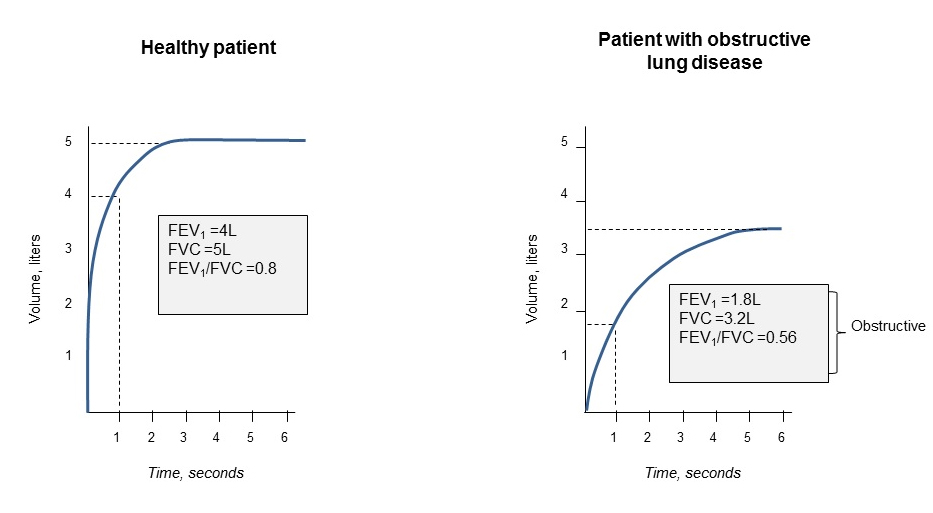Spirometry Testing
Pulmonary function testing measures how well you are breathing. There are different types of pulmonary function tests that can be done. Spirometry is one type of pulmonary function test. Spirometry is a simple test to measure how much (volume) and how fast (flow) you can move air into and out of your lungs.
This is a breathing test called spirometry.
It is a measurement of how much air you can take into your lungs and how fast you can blow it back out.
Before we do this test, I want to make sure there's no medical reason that you cannot take this test today.
Have you had any recent chest or eye surgery? No. How we do this test is by sitting up nice and tall in the chair, making sure both feet are on the floor, and then you'll put nose clips on your nose.
Then you'll put this portion of the mouthpiece in your mouth past your teeth. Get a good seal with your lips. Make sure your tongue's not in that hole.
Then I'll have you take two normal breaths in and out. Then a big breath in and blast it out hard and fast.
Keep blowing until I ask you to breathe in and come off the mouthpiece.
I will coach you through each step of the process, so just listen to me and relax and you'll be fine.
Okay, you ready? Ready.
Put nose clips on your nose.
Mouthpiece in your mouth.
Get a good seal.
Pretend you're sucking water through a straw, and you get a nice good seal.
Take a normal breath in, and empty that one all the way.
Empty.
Empty.
Empty.
Empty.
Now another normal one in.
And empty that one all the way.
Empty.
Empty.
Empty.
Empty.
Empty.
Now, big breath in.
Blast that part.
Blah, blah, blah, blah, blah, blah, blah, blah, blah, blah, keep blowing out all the way, blah, blah, blah, blah, blah, blah, blah, blah, blah, blah, blah, blah, blah, blah, blah, blah, breathe in and come off.
Good, very good. Okay, I wanna show you what your efforts look like on paper.
This is your big breath in, and this is your big breath out.
And as you keep blowing, it comes down and makes this curve.
Good job.
Thank you very much.
Why test my lung function?
Through routine spirometry, lung diseases can often be diagnosed in the early stages when treatment is most effective. Once a lung disease is diagnosed and treated, routine spirometry tests can monitor changes in lung functions with specific treatment. This will help your doctor find the best treatment plan for you.
What happens during the spirometry test?
You will be instructed how to perform spirometry. Basically, you will take in a deep breath and blow into a mouthpiece attached to the spirometer. You will blow out as hard and as fast as you can until your lungs feel absolutely empty. You will be asked to repeat the test several more times until there are two to three good efforts. You will be coached and encouraged to do your best during the test. A good effort during the test is important to get good results.
A computerized sensor (which is part of the spirometer) calculates and graphs the results. The results demonstrate a person's air flow rates or the volume forced out within the first second. This is the Forced Expiratory Volume in the first second (FEV1). This indicates whether or not there is airway obstruction. Spirometry also records the total volume of air forced out of the lungs. This is the Forced Vital Capacity (FVC). The percentage of the FVC exhaled in the first second (FEV1) is also calculated with spirometry. This is the FEV1/FVC. These spirometry results will help your doctor determine the best treatment for you.
Where can I go for a spirometry test?
Ask your doctor about having your lungs tested with spirometry. National Jewish Health offers free spirometry tests throughout the year at various locations in the Denver area and along the Front Range.
"The spirometry test is really similar to the blood pressure measurement," says National Jewish Health pulmonologist Reuben Cherniack, MD, MS. "Both should be given every time a physician sees a patient, since both tests show changes that can be recognized immediately."
This information has been approved by Amy Olson, MD, MSPH (December 2013).

